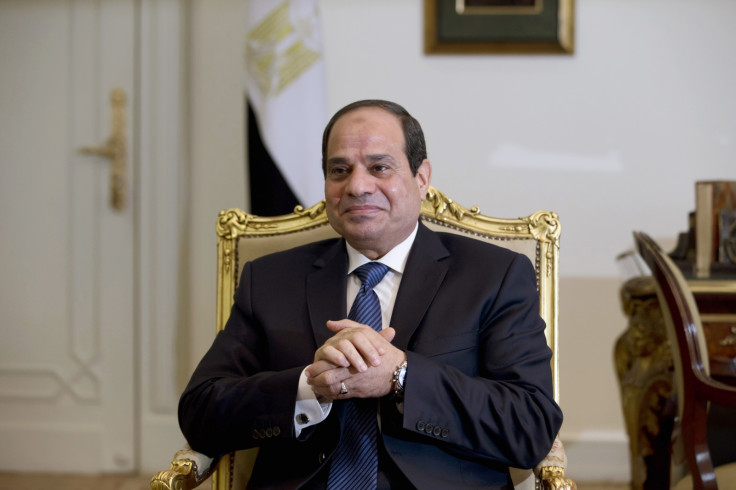Egypt's General Abdel Fattah el-Sisi is losing his wealthy friends in the Gulf

Much has been written about the merits of Egypt's president Abdul Fattah el-Sisi's strong-arm policies inside the country. It's safe to assume that these policies have not been a roaring success. In fact, under Sisi's leadership over the past two and a half years Egypt has struggled on every possible front. The Egyptian economy continues on its downward spiral and the human rights situation has never been worse with close to 40,000 people in prison for political reasons by some estimates.
On the security spectrum the country's top prosecutor Hisham Barakat, possibly the third highest ranking official in the country, assassination in broad daylight last summer exposed likely security breaches and failures that are compounded by the scores of military personnel killed by local terrorist groups such as Ansar Bait Al Maqdis in Northern Sinai.
President Sisi's incompetence could be viewed as a strategic threat to the Gulf States.
The Gulf States, with the exception of Qatar, have been steadfast allies of Sisi providing him with $12bn immediately following the popularly backed coup of 2013 and another $12bn at an economic summit last year. The Gulf States assistance to Egypt likely exceeds the official announced figures as Saudi and the UAE have also financed Egypt's purchases of Russian munitions over the past two years. As a testament to the Gulf States' enduring ties with Egypt when a recording was leaked of Sissi's close circle deriding the Gulf the Gulf leaders spoke to Sissi and reassured him of their nations continued support to his country.
In numerous speeches and interviews Sissi assured the Gulf States that their security is part of Egypt's security. Sissi employed the Egyptian colloquial phrase Masafat Al Sikka (we are on our way) to describe how swiftly Egyptian forces would be dispatched should the Gulf's security be compromised. However, in their hour of need, and despite the tens of billions of dollars of aid, investment and military purchases, Sisi simply let the Gulf States down. Cairo has refused to commit any troops in the current war on the Houthi militias whom Saudi considers as a proxy of the Iranian government, its greatest adversary in the region.

When news leaked last September of possible Egyptian troops in Yemen Cairo was quick to refute such claims as "groundless". Sisi was content to limit Egypt's participation to naval ships where there were no Houthis in sight. On the other hand, Sudan, with whom the Gulf States have has a history of strained relations, contributed by sending hundreds of troops. In fact a source told me that the Sudanese batallion surprised the coalition by requesting to be stationed on the front lines. Ultimately Sisi's Masafet Al Sikka turned out to be another of his many empty slogans.
Sisi's Egypt slide into irrelevance from Middle East affairs was evident when a photo was published in September 2014 of President Barrack Obama meeting with America's Arab allies who were participating in strikes against ISIS in Syria. While Jordan, Saudi Arabia, the UAE, Qatar and Bahrain were all represented at the table, Egypt was notable by its absence. This is in stark contrast to 1991 when Hosni Mubarak, the deposed Egyptian dictator, sent over thirty thousand troops to fight on the front lines to liberate Kuwait from Saddam's forces. Twenty-five years on it is unclear if Egypt's commitment to the Gulf States security is as assured. Today fewer people in the Gulf States consider Egypt as a potential counter balance to Iran's hegemonic power in the region and view Sisi as a questionable ally at best.
The Gulf States, who are stuck with Sisi for the next two and half and most probably six and a half years, should avoid unnecessarily over-associating themselves with his failed administration. Judging by its actions it is more than likely that his time in office will not be looked upon positively. Sadly for Egyptians Sisi's government's incompetence keep scaling new heights. Cairo continues to deny that what brought a Russian charter plane down last November was a terrorist attack despite Western and Russian consensus to the contrary. Political life has effectively come to a standstill in a country where political parties date back almost a century while a newly convened parliament is basically made up of Sisi apologists. Sisi's government is heavy on emotional rhetoric and void of political shrewdness. To put it mildly Sisi is no statesman.
In fact President Sisi's incompetence could be viewed as a strategic threat to the Gulf States. His refusal to grant even the most basic of rights to his politically active populace five years after a revolution that brought down another dictator is only screwing the lid tighter on a steaming kennel that is about to explode. Sisi however should not be pushed to step down; there is a risk of Egypt descending into deeper turmoil. For now the Gulf States should use their influence including economic aid to encourage Sisi to ease the tensions within Egypt. Releasing activists, unshackling the media, allowing NGOs to operate freely and loosening his insufferable stranglehold on political life in Egypt. For the Gulf States Sisi's redeeming characteristic was that he was no friend of the Muslim Brotherhood. The past two and a half years have demonstrated that he is little more than that.
*Jack Hamdan is a pseudonym for a Gulf based writer.
© Copyright IBTimes 2025. All rights reserved.





















